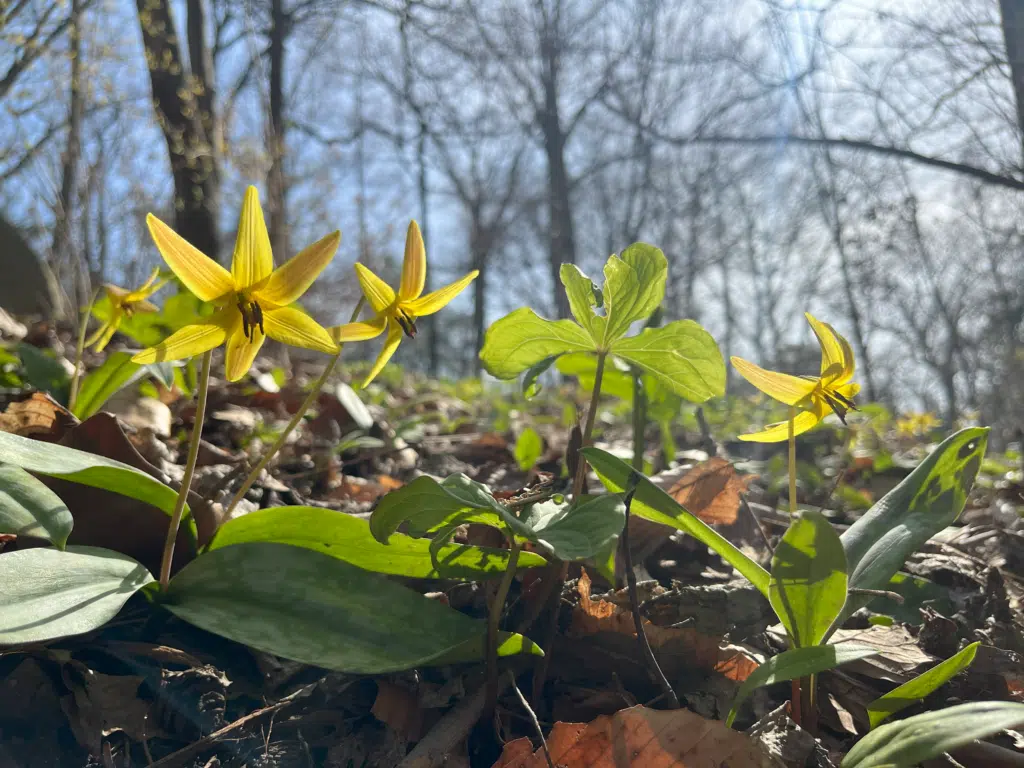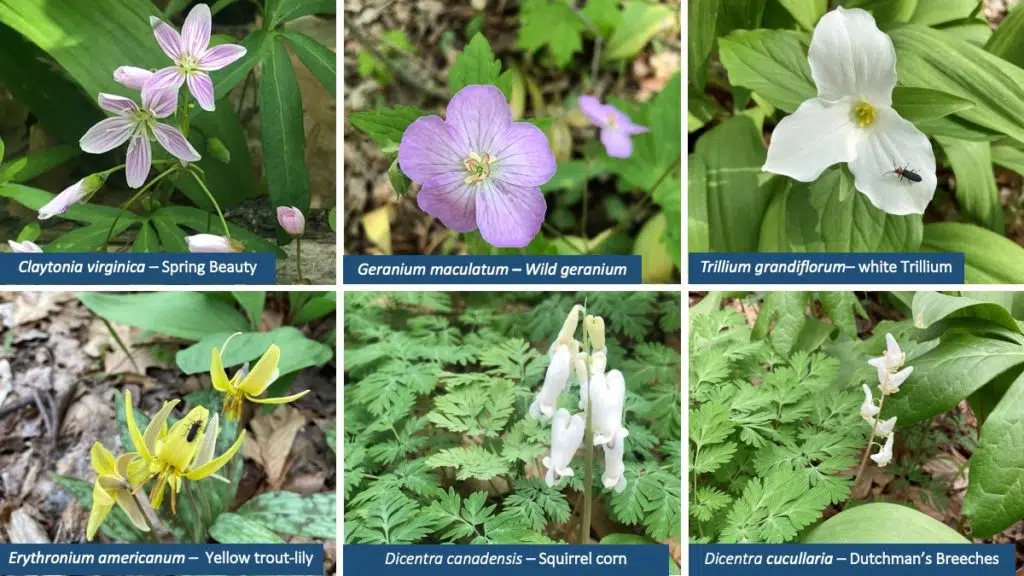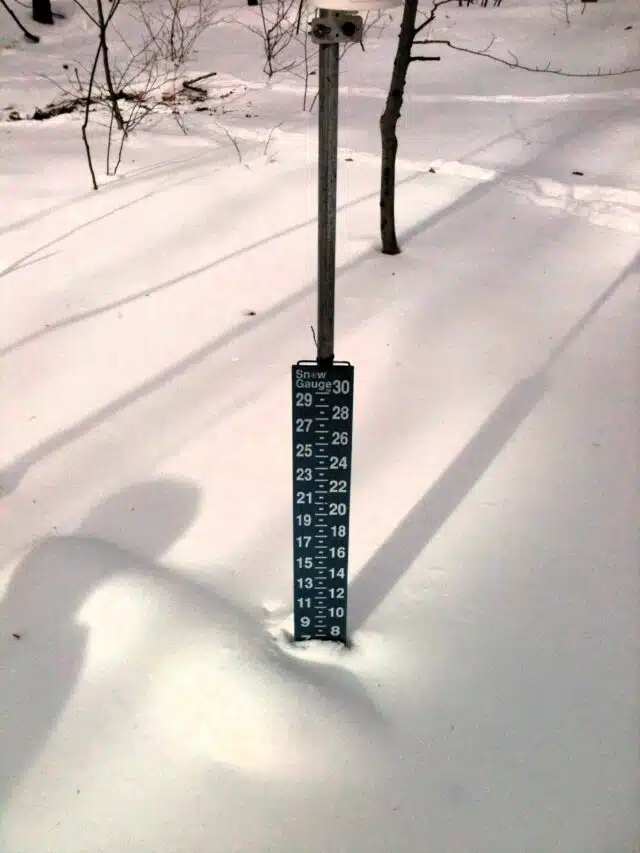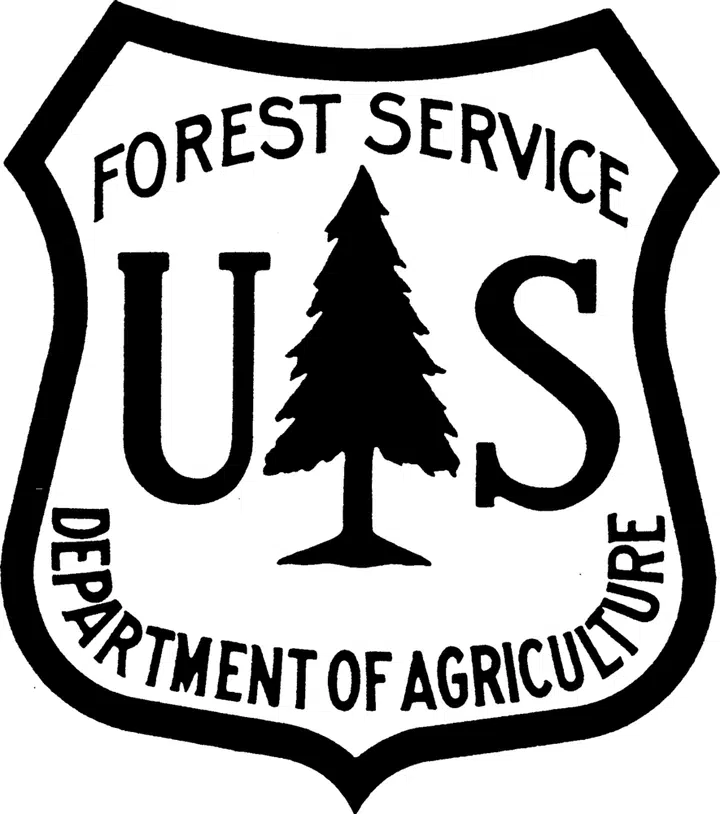Holden’s Wildflower Garden Is a Living Laboratory for Climate Change Research—Here’s What Our Researchers Have Learned
January 8, 2025

Public gardens like the Holden Arboretum and the Cleveland Botanical Garden are great places to visit. But patrons exploring the latest Frost event might miss that behind the scenes, these places are also research institutions, where staff biologists study plants all around the world—and sometimes, right outside their doors.
The green spaces at gardens serve as living laboratories, hosting collections of all sorts of plants growing right outside a researcher’s office and under the same conditions as one another. This makes public gardens a particularly useful place to study the impacts of a warming climate on plants.
In a new study, published in the journal Ecology and Evolution, Holden ecologists looked to the Arboretum’s Wildflower Garden to dig into how rising temperatures influence the life cycles of a type of wildflower called spring ephemerals. Spring ephemerals are native woodland wildflowers that conduct their whole above-ground life cycle during the short window between the end of winter and the closing of the forest canopy in spring. Because their window is so tight, and also highly weather-dependent, these flowers are expected to be extra sensitive to changes in climate.

The researchers could’ve monitored these wildflowers year after year after year, to see how the timing of their life cycles—called phenology—would change over time as the weather slowly crept warmer and increasingly erratic. (Climate projections for Cleveland are for a 2°F to 11°F increase by 2050.) But predicting the impending effects of climate change is something experts aren’t willing to wait around for. So the team used a clever workaround instead: A method ecologists call a common garden.
Read more: Analyzing Wildflower Phenology Across Botanical Gardens
Rather than wait for warmer weather, they went where weather was warmer. They visited wildflower gardens at four other public gardens to sample spring ephemerals growing under variety of different environmental conditions: Dawes Arboretum (OH), Chicago Botanic Garden (IL), Missouri Botanical Garden (MO), and Huntsville Botanical Garden (AL). Community scientists (volunteers) at each location gathered data on spring ephemerals, including when they sprouted, when they flowered, and when they died back for the year. The researchers worked with over 30 community scientists to gather data on 198 individual wildflowers from 14 different species.
The observations confirmed what they had feared: Warmer-than-average days were linked to shorter durations of key reproductive phases for these plants. Specifically, reproductive phases that occur earlier in the season were meaningfully affected, such as budding and fruiting. And some species, like spring beauties (Claytonia virginica) and trout lilies (Erythronium americanum), had some significantly shorter phenophases overall when compared to the other species. The finding underscores the vulnerability of these species to climate-induced shifts.

“These types of insights are not only crucial for conservationists seeking to prioritize species and strategies for conservation, but also provide critical insights into forest dynamics and resiliency under changing climate conditions.” said Chelsea Miller, lead author on the study. Miller is a former postdoctoral researcher in the Katie Stuble lab at Holden, now an assistant professor at the University of Akron.
“Public gardens offer a controlled yet natural environment that supports diverse plant collections,” said Stuble. “This makes them unparalleled resources for studying environmental changes across many species over broad scales. Their accessibility also empowers community scientists to contribute meaningfully to climate research.” Stuble is a community ecologist and the Director of Research at Holden Forests & Gardens.
In addition to their findings about spring ephemerals, this study highlights the value of public gardens as a space for important ecological research, as well as their role in fostering collaboration between scientists and the public. Studies like this cement public gardens in place as indispensable allies in the global effort to understand climate change and mitigate its impact on biodiversity.
Citation:
Miller, C. N., & Stuble, K. L. (2024). Warm Spring Days are Related to Shorter Durations of Reproductive Phenophases for Understory Forest Herbs. Ecology and Evolution, 14(12), e70700.
About Dr. Katie Stuble:
Katie Stuble, Ph.D., is a community ecologist and the Director of Research at Holden Forests & Gardens. Her research explores the mechanisms that maintain biodiversity and the ways global change—including invasive species and climate change—impacts communities and ecosystems. Current projects include studying climate-driven changes to community assembly, ant-mediated seed dispersal, and ecosystem restoration strategies. Dr. Stuble earned her Bachelor of Arts from St. Mary’s College of Maryland, her Master’s in Ecology from the University of Georgia, and her Ph.D. in Ecology and Evolutionary Biology from the University of Tennessee. She has been a research scientist at Holden Forests & Gardens since 2016.
About Holden Forests & Gardens:
Holden Forests & Gardens is made up of two of Northeast Ohio’s most important environmental and cultural institutions—the Holden Arboretum and Cleveland Botanical Garden—whose mission is to connect people with the wonder, beauty, and value of trees and plants, to inspire action for healthy communities. One of the largest public gardens in the country, Holden Forests & Gardens has over 22,000 member households and an annual attendance of over 300,000 for whom we strive to provide inspirational and educational visitor experiences. Holden’s science, conservation, and urban forestry work is widely acclaimed and helping to save native trees in the Great Lakes region and beyond.
Corresponding Author:
Dr. Katie Stuble, Director of Research
Holden Forests & Gardens
kstuble@holdenfg.org
Media Contact:
Dr. Anna Funk, Science Communications Specialist
Holden Forests & Gardens
afunk@holdenfg.org













